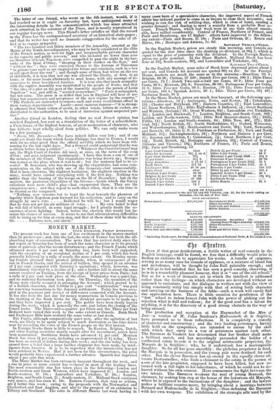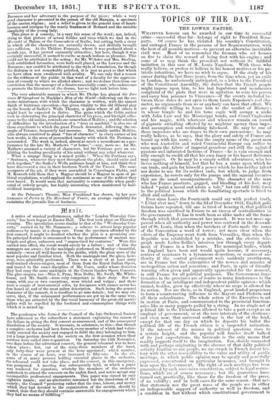qratrro.
Even if that great desideratum, a fertile writer of real comedy in the English language, could be found, we fear that a diffioulty would arise in finding an audience fit to appreciate his works. A bundle of epigrams, serving as so many cues for rounds of applause, or a mixture of broad fun and melodrame will be thought by John Bull palatable enough ; and he will go to bed satisfied that he has seen a good comedy, observing, if he is in a remarkably pleasant humour, that it is one of the old school." But as for a work of dramatic art in which the intelleot is addressed rather than the feelings—in which characters are developed without an approach to caricature, and the dialogue is written not with the view of being constantly witty but simply with that of setting forth character and carrying on the business of the fable—such a work will rarely find due appreciation here. There is little occasion for gentlemen of the "fast" school to imbue honest John with the power of picking out for rejection what is dull and tedious; • for if the good soul has a talent for anything, it is for the discovery of a good strong obstacle in the way of being amused.
The production and reception at the Haymarket of the Man of Law—a version of M. Jules Sandeau's Mademoiselle de la Seigliere, have prompted us to these reflections. It is completely a comedy of character and construction ; and the two leading personages, having little hold on the sympathies, are intended to amuse by the skill with which they carry on a war of astuteness against each other. The Baroness de Vaubert has determined that her brother shall make a brilliant match, and has accordingly persuaded the holder of a confiscated estate to cede it to the original aristocratic proprietor, the Marquis de la Seigliere ; who, be it understood, has a marriageable daughter. So far all has gone smoothly the plebeian proprietor is dead, the Marquis is in possession, and the young pair seem destined for each other. But the clever Baroness has an enemy in the equally clever ad- vocate Destournelles; who finds a claimant to the estate in the person of a son of the late proprietor, supposed to have been killed, but now re- turned with a full right to his inheritance, of which he could not be de- barred without his own consent. Here commences the fight between the two talents. The Baroness weakens the zeal of young Bernard, the claimant, by making him stop at the house of the luxurious old Marquis, where he is exposed to the fascinations of the daughter; and the lawyer makes a brilliant counter-move, by bringing about a marriage between Bernard and Mademoiselle de la Seigliere,—thus defeating the Baroness with her own weapons. The exhibition of the strategic arts used by the
Baroness and her adversary is the purpose of the piece ; while a very good character is presented in the person of the old Marquis, a specimen of the anoien regime ; and a relief is given to the general tone of heart- lessness and intrigue by the manly frankness of Bernard and the amiable simplicity of the young lady.
This piece is a comedy, in a very fair sense of the word ; not, indeed, rising to that picture of actual foibles and vices which we find in the Mei-cadet of Balzac or the Cameraderio of Scribe, but setting forth a story in which all the characters are naturally drawn, and skilfully brought into collision. At the Theatre Francais, where it was produced about a month ago, it has proved eminently attractive ' but here, though it was certainly successful, it seemed to excite as mucht tedium' pleasure. This could not be attributed to the acting ; for Mr. Webster and Mrs. Sterling, both established favourites, were both well placed, as the Lawyer and the Baroness ; nor could it be attributed to the style of translation, for though the dialogue is not remarkably polished, it is just as good as that which we have often seen swallowed with avidity. We can only find a reason for the coldness of the public in that want of a faculty for the apprecia- tion of comedy to which we alluded above ; and we deduce therefrom our conviction that the manager of a theatre essentially comic, who endeavours to promote the literature of the drama, has no light task before him.
























 Previous page
Previous page